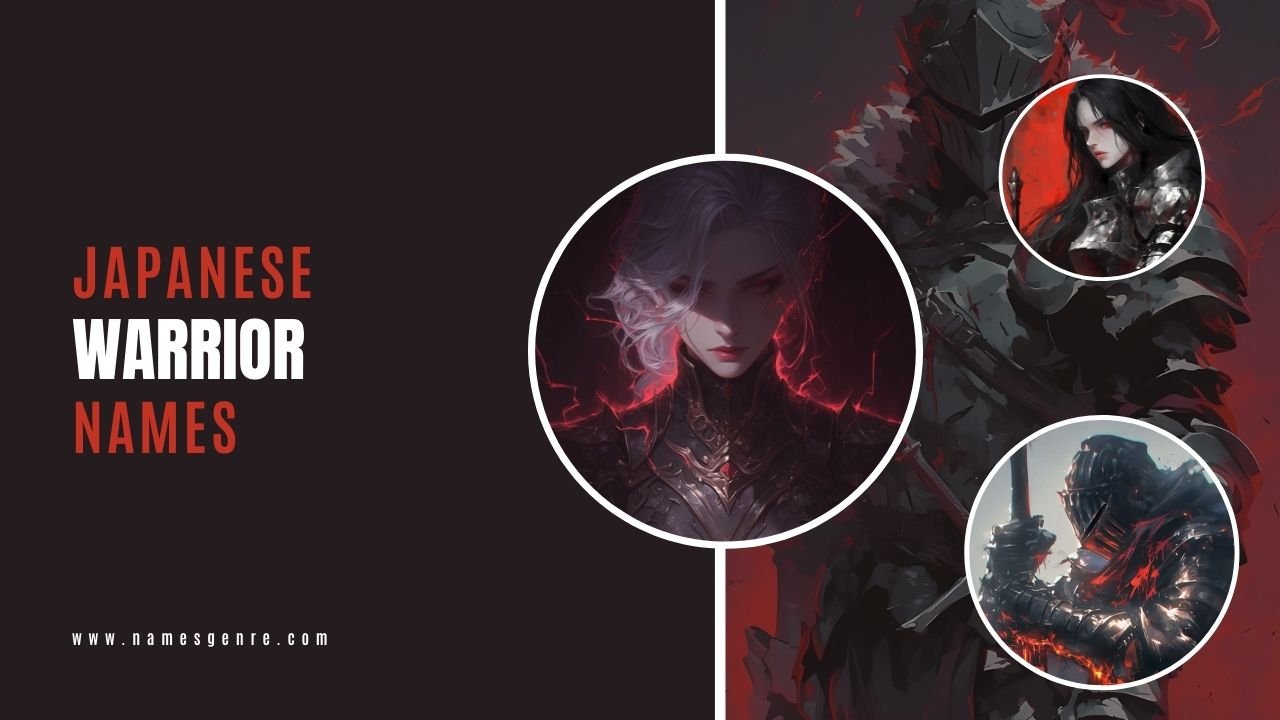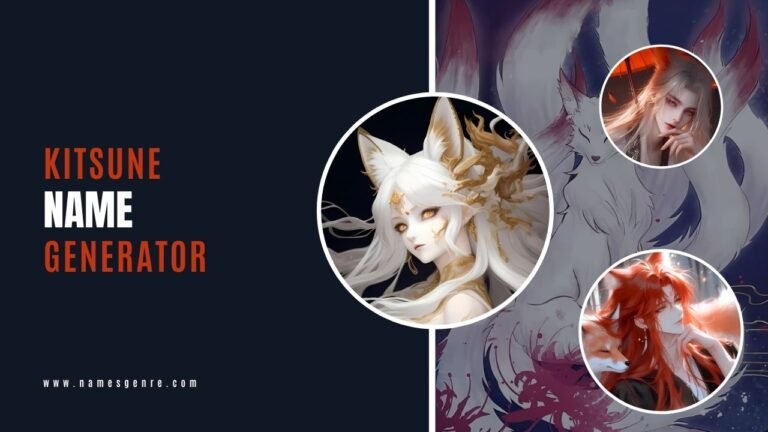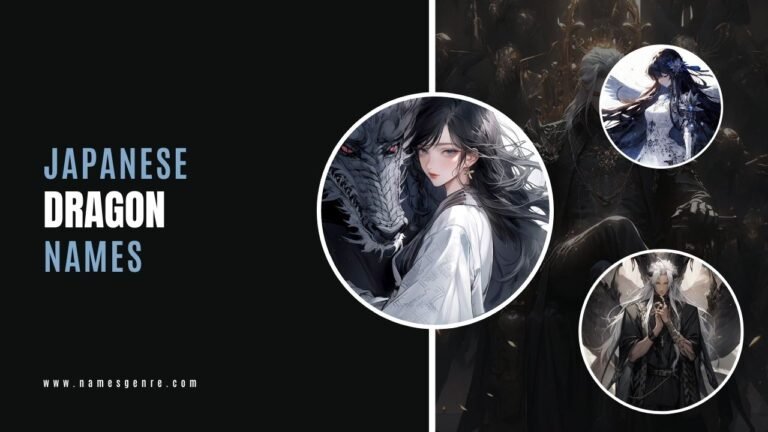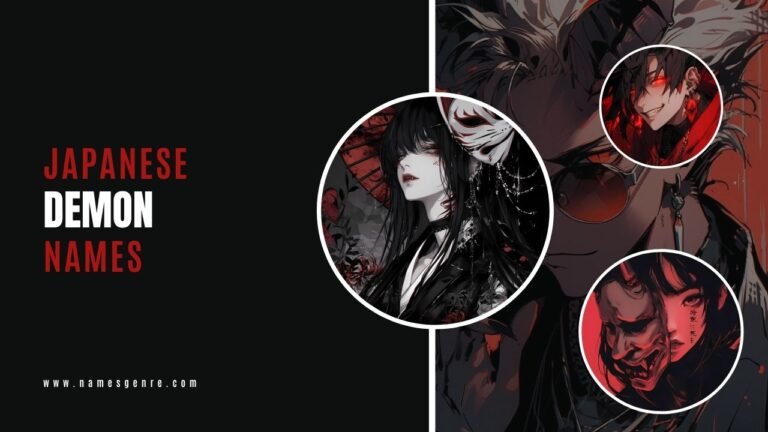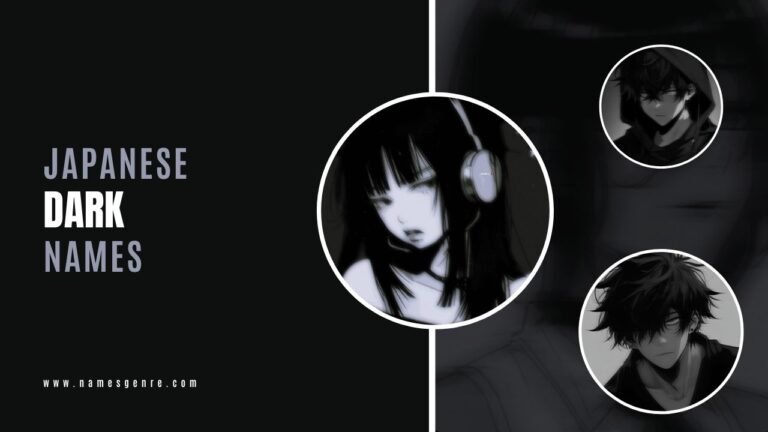If you’re looking for an interesting name that can express some kind of strength and honor, whether for a story, game, or personal use then this article is just for you. Here, I’ll share some of the top Japanese warrior names, and by using these you can build up your own genuine and compelling fantasy characters more accurately. Moreover, names that mean warrior also carry a powerful spirit that can inspire determination and strength in everyday life, making it a perfect choice for parents to use one of these names as their children’s names.
Japanese Warrior Names for Male
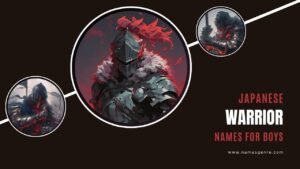
If you are looking for warrior names for boys then you’ve made an excellent choice. After all a warrior has all the essential qualities that everyone seeks in a man, especially strength, courage, honor, and bravery. Similarly, warrior names for boys are powerful and resonate with qualities like strength, courage, and honor, all of which were highly valued in traditional Japanese warrior culture.
just think of a name with meanings like “brave heart” or “strong protector.” Wouldn’t it be perfect for boys? After all when they will grow up, they can proudly embrace such names while being motivated to accomplish greater things for both people and society.
Takeshi (武士)
- Kanji: 武 (warrior) + 士 (samurai)
- Meaning: “Warrior samurai”
- Pronunciation: TAH-keh-shee
Rikuto (陸翔)
- Kanji: 陸 (land) + 翔 (soar)
- Meaning: “Soaring land warrior”
- Pronunciation: REE-koo-toh
Masaru (勝)
- Kanji: 勝 (victory)
- Meaning: “Victorious warrior”
- Pronunciation: MAH-sah-roo
Shigeru (茂)
- Kanji: 茂 (luxuriant/thrive)
- Meaning: “Thriving warrior”
- Pronunciation: SHEE-geh-roo
Hikaru (光)
- Kanji: 光 (light)
- Meaning: “Warrior of light”
- Pronunciation: HEE-kah-roo
Daiki (大輝)
- Kanji: 大 (great) + 輝 (radiance)
- Meaning: “Great radiance”
- Pronunciation: DAI-kee
Genji (源氏)
- Kanji: 源 (source/origin) + 氏 (clan)
- Meaning: “Source of the warrior clan”
- Pronunciation: GEN-jee
Isamu (勇)
- Kanji: 勇 (courage)
- Meaning: “Courageous warrior”
- Pronunciation: EE-sah-moo
Keitaro (慶太郎)
- Kanji: 慶 (rejoice) + 太郎 (eldest son)
- Meaning: “Rejoicing eldest warrior”
- Pronunciation: KAY-tah-roh
Ryoji (亮司)
- Kanji: 亮 (clear) + 司 (govern)
- Meaning: “Clear leader warrior”
- Pronunciation: REE-oh-jee
Shinjiro (慎二郎)
- Kanji: 慎 (humility) + 二郎 (second son)
- Meaning: “Humble second warrior”
- Pronunciation: SHEEN-jee-roh
Katsuya (勝也)
- Kanji: 勝 (victory) + 也 (also)
- Meaning: “Warrior of victory”
- Pronunciation: KAH-tsu-yah
Haruto (晴翔)
- Kanji: 晴 (clear skies) + 翔 (soar)
- Meaning: “Soaring under clear skies”
- Pronunciation: HAH-roo-toh
Takashi (崇史)
- Kanji: 崇 (esteem) + 史 (history)
- Meaning: “Honored warrior of history”
- Pronunciation: TAH-kah-shee
Eiji (英司)
- Kanji: 英 (hero) + 司 (govern)
- Meaning: “Heroic leader”
- Pronunciation: EH-jee
Minoru (実)
- Kanji: 実 (truth/fruit)
- Meaning: “True warrior”
- Pronunciation: MEE-noh-roo
Tatsuya (達也)
- Kanji: 達 (achieve) + 也 (also)
- Meaning: “Achieving warrior”
- Pronunciation: TAH-tsu-yah
Yamato (大和)
- Kanji: 大 (great) + 和 (peace)
- Meaning: “Great peace warrior”
- Pronunciation: YAH-mah-toh
Makoto (誠)
- Kanji: 誠 (sincerity)
- Meaning: “Sincere warrior”
- Pronunciation: MAH-koh-toh
Kojiro (小次郎)
- Kanji: 小 (small) + 次郎 (second son)
- Meaning: “Small but mighty warrior”
- Pronunciation: KOH-jee-roh
Raizo (雷蔵)
- Kanji: 雷 (thunder) + 蔵 (storehouse)
- Meaning: “Keeper of thunder”
- Pronunciation: RAI-zoh
Kenji (健司)
- Kanji: 健 (health) + 司 (govern)
- Meaning: “Healthy leader warrior”
- Pronunciation: KEN-jee
Noboru (昇)
- Kanji: 昇 (ascend)
- Meaning: “Ascending warrior”
- Pronunciation: NOH-boh-roo
Riku (陸)
- Kanji: 陸 (land)
- Meaning: “Warrior of the land”
- Pronunciation: REE-koo
Akito (明翔)
- Kanji: 明 (bright) + 翔 (soar)
- Meaning: “Bright soaring warrior”
- Pronunciation: AH-kee-toh
Jiro (次郎)
- Kanji: 次郎 (second son)
- Meaning: “Second son warrior”
- Pronunciation: JEE-roh
Ryuto (龍翔)
- Kanji: 龍 (dragon) + 翔 (fly)
- Meaning: “Flying dragon warrior”
- Pronunciation: REE-yoo-toh
Kiyoshi (清司)
- Kanji: 清 (pure) + 司 (govern)
- Meaning: “Pure warrior leader”
- Pronunciation: KEE-yoh-shee
Naoki (直樹)
- Kanji: 直 (honest) + 樹 (tree)
- Meaning: “Honest tree warrior”
- Pronunciation: NAH-oh-kee
Hideo (英夫)
- Kanji: 英 (heroic) + 夫 (man)
- Meaning: “Heroic man”
- Pronunciation: HEE-deh-oh
Masaki (雅樹)
- Kanji: 雅 (elegant) + 樹 (tree)
- Meaning: “Elegant warrior tree”
- Pronunciation: MAH-sah-kee
Ryunosuke (龍之介)
- Kanji: 龍 (dragon) + 之 (of) + 介 (support)
- Meaning: “Dragon’s support warrior”
- Pronunciation: REE-yoo-noh-soo-keh
Kentarou (健太郎)
- Kanji: 健 (healthy) + 太郎 (eldest son)
- Meaning: “Healthy eldest warrior”
- Pronunciation: KEN-tah-roh
Shouta (翔太)
- Kanji: 翔 (fly) + 太 (great)
- Meaning: “Great flyer”
- Pronunciation: SHOH-tah
Masato (正人)
- Kanji: 正 (righteous) + 人 (person)
- Meaning: “Righteous warrior”
- Pronunciation: MAH-sah-toh
Toshiro (敏郎)
- Kanji: 敏 (quick/agile) + 郎 (son)
- Meaning: “Agile warrior”
- Pronunciation: TOH-shee-roh
Soutaro (壮太郎)
- Kanji: 壮 (robust) + 太郎 (eldest son)
- Meaning: “Robust eldest warrior”
- Pronunciation: SOH-tah-roh
Kazuma (一真)
- Kanji: 一 (one) + 真 (true)
- Meaning: “True and united warrior”
- Pronunciation: KAH-zoo-mah
Tadashi (忠志)
- Kanji: 忠 (loyalty) + 志 (will)
- Meaning: “Loyal and willful warrior”
- Pronunciation: TAH-dah-shee
Rento (蓮翔)
- Kanji: 蓮 (lotus) + 翔 (fly)
- Meaning: “Flying lotus warrior”
- Pronunciation: REN-toh
Japanese Warrior Names for Female

There’s one thing that all warrior names have in common, whether for boys or girls… yes, I’m talking about strength and courage. In Japanese history and folklore, female warriors like Tomoe Gozen exemplify bravery and skill, showing that warrior virtues are not limited by gender.
Also, it doesn’t matter whether you are a boy or girl—any person can have a strong spirit like a warrior as long as they choose to. This is one of the reasons why names inspired by these qualities provide girls with empowering identities, encouraging them to embrace strength, determination, and resilience. Warrior names for girls can also highlight the idea that courage and honor are traits anyone can possess, fostering a sense of self-confidence and pride.
Akemi (明美)
- Kanji: 明 (bright) + 美 (beauty)
- Meaning: “Bright beauty warrior”
- Pronunciation: AH-keh-mee
Ayaka (彩花)
- Kanji: 彩 (colorful) + 花 (flower)
- Meaning: “Colorful flower warrior”
- Pronunciation: AH-yah-kah
Chihiro (千尋)
- Kanji: 千 (thousand) + 尋 (search)
- Meaning: “Thousand searches”
- Pronunciation: CHEE-hee-roh
Etsuko (悦子)
- Kanji: 悦 (joy) + 子 (child)
- Meaning: “Child of joy”
- Pronunciation: ET-soo-koh
Fumiko (文子)
- Kanji: 文 (writing) + 子 (child)
- Meaning: “Child of letters”
- Pronunciation: FOO-mee-koh
Haruka (遥香)
- Kanji: 遥 (distant) + 香 (fragrance)
- Meaning: “Distant fragrance warrior”
- Pronunciation: HAH-roo-kah
Itsuki (樹)
- Kanji: 樹 (tree)
- Meaning: “Warrior of the trees”
- Pronunciation: EE-tsu-kee
Kanna (栞奈)
- Kanji: 栞 (bookmark) + 奈 (calm)
- Meaning: “Calm warrior guide”
- Pronunciation: KAHN-nah
Kazumi (一美)
- Kanji: 一 (one) + 美 (beauty)
- Meaning: “One beautiful warrior”
- Pronunciation: KAH-zoo-mee
Mikako (美佳子)
- Kanji: 美 (beauty) + 佳 (excellent) + 子 (child)
- Meaning: “Beautiful, excellent child warrior”
- Pronunciation: MEE-kah-koh
Nanami (七海)
- Kanji: 七 (seven) + 海 (sea)
- Meaning: “Seven seas warrior”
- Pronunciation: NAH-nah-mee
Nozomi (望)
- Kanji: 望 (hope)
- Meaning: “Warrior of hope”
- Pronunciation: NOH-zoh-mee
Reika (怜花)
- Kanji: 怜 (wise) + 花 (flower)
- Meaning: “Wise flower warrior”
- Pronunciation: RAY-kah
Rina (梨奈)
- Kanji: 梨 (pear) + 奈 (calm)
- Meaning: “Calm pear blossom warrior”
- Pronunciation: REE-nah
Sakura (桜)
- Kanji: 桜 (cherry blossom)
- Meaning: “Cherry blossom warrior”
- Pronunciation: SAH-koo-rah
Satomi (里美)
- Kanji: 里 (village) + 美 (beauty)
- Meaning: “Beautiful village warrior”
- Pronunciation: SAH-toh-mee
Tsubaki (椿)
- Kanji: 椿 (camellia)
- Meaning: “Camellia flower warrior”
- Pronunciation: TSOO-bah-kee
Umeko (梅子)
- Kanji: 梅 (plum) + 子 (child)
- Meaning: “Plum blossom warrior child”
- Pronunciation: OO-meh-koh
Yukari (紫)
- Kanji: 紫 (purple)
- Meaning: “Warrior of purple grace”
- Pronunciation: YOO-kah-ree
Misaki (美咲)
- Kanji: 美 (beauty) + 咲 (blossom)
- Meaning: “Beautiful blossom warrior”
- Pronunciation: MEE-sah-kee
Asami (朝美)
- Kanji: 朝 (morning) + 美 (beauty)
- Meaning: “Morning beauty warrior”
- Pronunciation: AH-sah-mee
Rika (里佳)
- Kanji: 里 (village) + 佳 (excellent)
- Meaning: “Excellent village warrior”
- Pronunciation: REE-kah
Chiaki (千秋)
- Kanji: 千 (thousand) + 秋 (autumn)
- Meaning: “Warrior of a thousand autumns”
- Pronunciation: CHEE-ah-kee
Akiko (明子)
- Kanji: 明 (bright) + 子 (child)
- Meaning: “Bright warrior child”
- Pronunciation: AH-kee-koh
Emiko (恵美子)
- Kanji: 恵 (blessing) + 美 (beauty) + 子 (child)
- Meaning: “Blessed beauty warrior child”
- Pronunciation: EH-mee-koh
Himari (陽葵)
- Kanji: 陽 (sun) + 葵 (hollyhock)
- Meaning: “Sun hollyhock warrior”
- Pronunciation: HEE-mah-ree
Aiko (愛子)
- Kanji: 愛 (love) + 子 (child)
- Meaning: “Child of love warrior”
- Pronunciation: EYE-koh
Koharu (小春)
- Kanji: 小 (small) + 春 (spring)
- Meaning: “Small spring warrior”
- Pronunciation: KOH-hah-roo
Nao (尚)
- Kanji: 尚 (esteem)
- Meaning: “Esteemed warrior”
- Pronunciation: NAH-oh
Sayaka (沙也香)
- Kanji: 沙 (sand) + 也 (also) + 香 (fragrance)
- Meaning: “Fragrant sand warrior”
- Pronunciation: SAH-yah-kah
Izumi (泉)
- Kanji: 泉 (spring/fountain)
- Meaning: “Spring of life warrior”
- Pronunciation: EE-zoo-mee
Megumi (恵)
- Kanji: 恵 (blessing)
- Meaning: “Blessed warrior”
- Pronunciation: MEH-goo-mee
Yumiko (由美子)
- Kanji: 由 (reason) + 美 (beauty) + 子 (child)
- Meaning: “Beautiful reason warrior child”
- Pronunciation: YOO-mee-koh
Kaori (香織)
- Kanji: 香 (fragrance) + 織 (weave)
- Meaning: “Fragrant weave warrior”
- Pronunciation: KAH-oh-ree
Tomomi (智美)
- Kanji: 智 (wisdom) + 美 (beauty)
- Meaning: “Wise beauty warrior”
- Pronunciation: TOH-moh-mee
Mio (美緒)
- Kanji: 美 (beauty) + 緒 (thread)
- Meaning: “Beautiful thread warrior”
- Pronunciation: MEE-oh
Reina (麗奈)
- Kanji: 麗 (lovely) + 奈 (calm)
- Meaning: “Calm lovely warrior”
- Pronunciation: RAY-nah
Yoko (陽子)
- Kanji: 陽 (sun) + 子 (child)
- Meaning: “Child of the sun warrior”
- Pronunciation: YOH-koh
Saori (沙織)
- Kanji: 沙 (sand) + 織 (weave)
- Meaning: “Warrior weaving the sands”
- Pronunciation: SAH-oh-ree
Hikari (光)
- Kanji: 光 (light)
- Meaning: “Light warrior”
- Pronunciation: HEE-kah-ree
Japanese Unisex name that means warrior
Warriors are not bound by any gender, and neither are names that mean “warrior.” After all, “warrior” is an identity you can claim by becoming one or accomplishing something warrior-like. And as I’ve already mentioned that the common traits you’ll find in any warrior are loyalty, bravery, and discipline—qualities that transcend gender and cultural boundaries.
Moreover in Japanese culture, the spirit of a warrior is open to anyone who embodies these principles, making such names meaningful for all. Choosing a unisex warrior name promotes inclusivity and encourages the idea that courage and strength are for everyone while symbolizing a shared resilience and honor that is relevant across all identities.
Akihiro (明宏)
- Kanji: 明 (bright) + 宏 (wide/expansive)
- Meaning: “Bright and expansive”
- Pronunciation: AH-kee-hee-roh
Haruto (陽翔)
- Kanji: 陽 (sun) + 翔 (fly/soar)
- Meaning: “Soaring sun”
- Pronunciation: HAH-roo-toh
Rikuya (陸也)
- Kanji: 陸 (land) + 也 (also)
- Meaning: “Land warrior”
- Pronunciation: REE-koo-yah
Kenshin (剣心)
- Kanji: 剣 (sword) + 心 (heart)
- Meaning: “Sword heart”
- Pronunciation: KEHN-shin
Takuma (拓真)
- Kanji: 拓 (expand) + 真 (true)
- Meaning: “True expansion”
- Pronunciation: TAH-koo-mah
Reika (礼佳)
- Kanji: 礼 (gratitude) + 佳 (beautiful)
- Meaning: “Beautiful gratitude”
- Pronunciation: REH-ee-kah
Souta (蒼太)
- Kanji: 蒼 (blue/warrior spirit) + 太 (great)
- Meaning: “Great warrior spirit”
- Pronunciation: SOH-tah
Tsubasa (翼)
- Kanji: 翼 (wing)
- Meaning: “Wing of a warrior”
- Pronunciation: TSOO-bah-sah
Arata (新)
- Kanji: 新 (new)
- Meaning: “New beginnings”
- Pronunciation: AH-rah-tah
Renji (蓮司)
- Kanji: 蓮 (lotus) + 司 (govern)
- Meaning: “Lotus warrior”
- Pronunciation: REN-jee
Kaede (楓)
- Kanji: 楓 (maple)
- Meaning: “Warrior of the maple tree”
- Pronunciation: KAH-eh-deh
Hinata (日向)
- Kanji: 日 (sun) + 向 (facing)
- Meaning: “Facing the sun”
- Pronunciation: HEE-nah-tah
Ryoma (龍馬)
- Kanji: 龍 (dragon) + 馬 (horse)
- Meaning: “Dragon horse”
- Pronunciation: REE-yoh-mah
Kazuki (一樹)
- Kanji: 一 (one) + 樹 (tree)
- Meaning: “Lone tree warrior”
- Pronunciation: KAH-zoo-kee
Aoi (葵)
- Kanji: 葵 (hollyhock flower)
- Meaning: “Warrior’s flower”
- Pronunciation: AH-oh-ee
Kaito (海翔)
- Kanji: 海 (ocean) + 翔 (fly)
- Meaning: “Ocean flyer”
- Pronunciation: KAH-ee-toh
Ichika (一花)
- Kanji: 一 (one) + 花 (flower)
- Meaning: “One warrior flower”
- Pronunciation: EE-chee-kah
Shinobu (忍)
- Kanji: 忍 (endurance)
- Meaning: “Enduring warrior”
- Pronunciation: SHEE-noh-boo
Kohaku (琥珀)
- Kanji: 琥珀 (amber)
- Meaning: “Amber warrior”
- Pronunciation: KOH-hah-koo
Nao (直)
- Kanji: 直 (honest)
- Meaning: “Honest warrior”
- Pronunciation: NAH-oh
Mikasa (三笠)
- Kanji: 三 (three) + 笠 (hat)
- Meaning: “Tri-armed warrior”
- Pronunciation: MEE-kah-sah
Itsuki (樹)
- Kanji: 樹 (tree)
- Meaning: “Strong tree warrior”
- Pronunciation: EETS-kee
Haruka (遥)
- Kanji: 遥 (distant)
- Meaning: “Distant warrior”
- Pronunciation: HAH-roo-kah
Minato (湊)
- Kanji: 湊 (harbor)
- Meaning: “Harbor of warriors”
- Pronunciation: MEE-nah-toh
Kazuya (和也)
- Kanji: 和 (peace) + 也 (also)
- Meaning: “Warrior of peace”
- Pronunciation: KAH-zoo-yah
Yuzuki (柚月)
- Kanji: 柚 (citron) + 月 (moon)
- Meaning: “Moon citron warrior”
- Pronunciation: YOO-zoo-kee
Sora (空)
- Kanji: 空 (sky)
- Meaning: “Sky warrior”
- Pronunciation: SOH-rah
Rina (里奈)
- Kanji: 里 (village) + 奈 (apple tree)
- Meaning: “Apple warrior of the village”
- Pronunciation: REE-nah
Fuyuki (冬樹)
- Kanji: 冬 (winter) + 樹 (tree)
- Meaning: “Winter tree warrior”
- Pronunciation: FOO-yoo-kee
Takara (宝)
- Kanji: 宝 (treasure)
- Meaning: “Treasure warrior”
- Pronunciation: TAH-kah-rah
Yuki (雪)
- Kanji: 雪 (snow)
- Meaning: “Snow warrior”
- Pronunciation: YOO-kee
Masaki (正樹)
- Kanji: 正 (justice) + 樹 (tree)
- Meaning: “Tree of justice”
- Pronunciation: MAH-sah-kee
Ayumu (歩夢)
- Kanji: 歩 (walk) + 夢 (dream)
- Meaning: “Walking dream warrior”
- Pronunciation: AH-yoo-moo
Ren (蓮)
- Kanji: 蓮 (lotus)
- Meaning: “Lotus warrior”
- Pronunciation: REN
Hikosei (彦星)
- Kanji: 彦 (boy/prince) + 星 (star)
- Meaning: “Star prince”
- Pronunciation: HEE-koh-say
Significance of Warrior Names in Japanese
As you know, warriors are symbols of strength, courage, and resilience while representing loyalty, honor, and bravery. Similarly, names related to them also express similar meanings while adding some extra depth to them.
In Japan, warrior names are deeply rooted in the ancient traditions of bushido (the way of the warrior). These names carry meanings that reflect the values cherished by samurai and martial figures, such as “courageous heart,” “protector,” or “strong spirit.” Each name serves not only as an identity but also as a reminder of the virtues that defined Japan’s legendary warriors.
In addition to personal virtues, Japanese warrior names signify a deep commitment to community and duty, reflecting the warrior’s role as a protector of family and clan. In today’s world, giving your child a name like this can be a meaningful choice if you wish to see them in a respected role that includes protection, duty, honor, or even a military profession.

